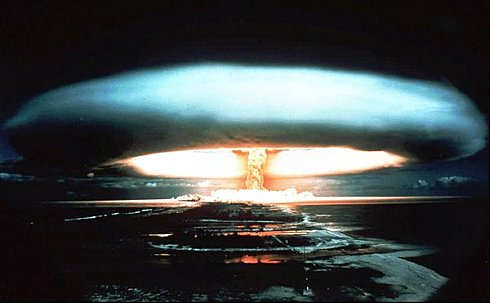Archives
AND MORE...

Risk-Averse Spies
_____________________

The Syrian Boom
_____________________

Holy Nukes
_____________________

Iran Triples Its Capacity
_____________________
March 18, 2012
Oops, They Meant It…
The New York Times piece below, entitled “U.S. Faces a Tricky Task in Assessment of Data on Iran” may leave some confused, but likely no more confused than American intelligence analysts, notwithstanding their National Intelligence Estimates.
One has to question the seriousness of any Intelligence Estimate that reflects a “consensus of analysts from 16 agencies.” How do multiple analysts from multiple agencies sift through multiple “shards of information that are ambiguous or incomplete,” maybe even outdated, and come up with a guesstimate they can all agree on? That’s like giving a hundred people a handful of pieces from a million-piece jigsaw puzzle and asking them to agree on what the finished puzzle will show.
Short of a black cloud over our heads, what are the chances of knowing with 100% certainty that Iran has built a nuclear bomb? (See “Risk-Averse Spies”)
Remember those WMDs Saddam Hussein supposedly had, but then didn’t have because we couldn’t find them? To this day, we have yet to hear an explanation as to what was in those truck convoys heading out of Iraq in the middle of the night, on the road to Damascus (as shown in satellite photos at the beginning of the Iraq war). Syria today is widely believed to possess one of the world's largest inventories of mustard blister agent, sarin nerve gas and possibly VX nerve agent. Augmented by stockpiles from Iraq?
Bluntly put, intelligence analysis is basically a crapshoot, i.e., there are no sure bets. So when dealing with a bellicose regime, religious fanatics and nuclear weapons, and the possibility of error, would you rather our leaders err on the side of being overly-cautious or not being cautious enough?
The New York Times | March 17, 2012
U.S. Faces a Tricky Task in Assessment of Data on Iran
By James Risen

A nuclear bomb explodes in a test on the Mururoa atoll in French Polynesia in the early seventies. Photo: AP / Courtesy: news.nationalgeographic.com
WASHINGTON — While American spy agencies have believed that the Iranians halted efforts to build a nuclear bomb back in 2003, the difficulty in assessing the government's ambitions was evident two years ago, when what appeared to be alarming new intelligence emerged, according to current and former United States officials.
Intercepted communications of Iranian officials discussing their nuclear program raised concerns that the country's leaders had decided to revive efforts to develop a weapon, intelligence officials said.
That, along with a stream of other information, set off an intensive review and delayed publication of the 2010 National Intelligence Estimate, a classified report reflecting the consensus of analysts from 16 agencies. But in the end, they deemed the intercepts and other evidence unpersuasive, and they stuck to their longstanding conclusion.
The intelligence crisis that erupted in 2010, which has not been previously disclosed, only underscores how central that assessment has become to matters of war and peace.
Today, as suspicions about Iran's nuclear ambitions have provoked tough sanctions and threats of military confrontation, top administration officials have said that Iran still has not decided to pursue a weapon, reflecting the intelligence community's secret analysis. But if that assessment changes, it could lift a brake set by President Obama, who has not ruled out military options as a last resort to prevent Iran gaining nuclear arms.
Publicly and privately, American intelligence officials express confidence in the spy agencies' assertions. Still, some acknowledge significant intelligence gaps in understanding the intentions of Iran's leaders and whether they would approve the crucial steps toward engineering a bomb, the most covert aspect of one of the most difficult intelligence collection targets in the world.
Much of what analysts sift through are shards of information that are ambiguous or incomplete, sometimes not up to date, and that typically offer more insight about what the Iranians are not doing than evidence of what they are up to.
As a result, officials caution that they cannot offer certainty. More here...
Log In »
Notable Quotables
"Mr. Netanyahu is one of the most media-savvy politicians on the planet. On Friday he appeared live via video link on 'Real Time with Bill Maher,' taking the host’s alternately sardonic and serious line of questioning with gazelle-like alacrity."
~ Anthony Grant, jourrnalist who has written for many major newspapers and worked in television at Paris and Tel Aviv, interviewing former PM Benjamin Netanyahu on Monday, at the outset of Mr. Netanyahu's new book (more here).


